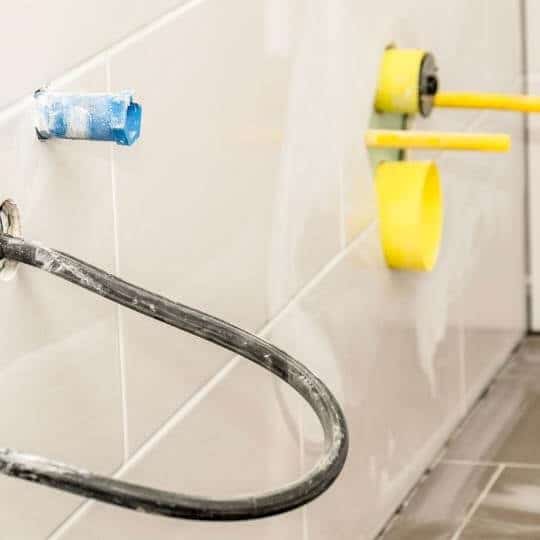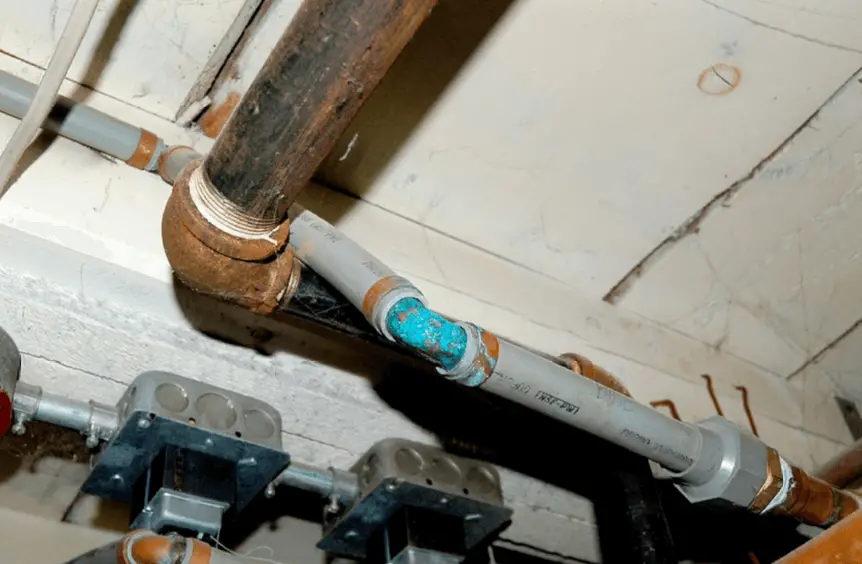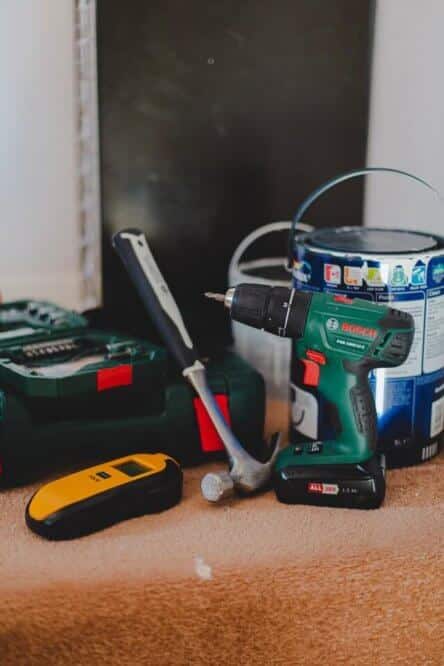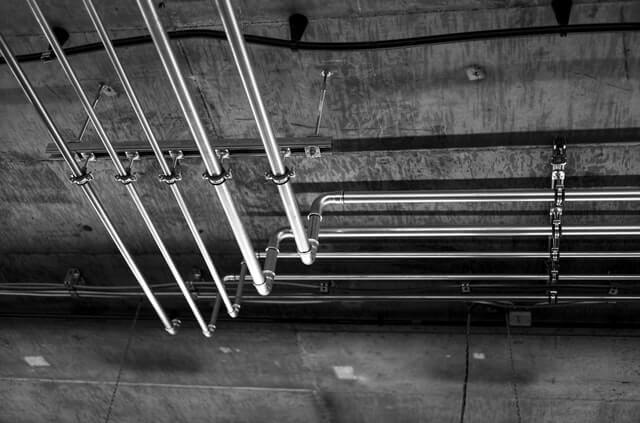Should I buy a house with polybutylene pipes? This question has become increasingly common among homebuyers in recent years
Purchasing a home is a great investment, and it’s crucial to consider all important aspects before making a decision. One crucial factor to assess is the condition of the plumbing system, particularly if the house has polybutylene pipes.
Polybutylene piping became largely utilized in homes from the 1970s to the 1990s. This means that many houses available today may also have them.
Understanding Polybutylene Pipes

Polybutylene pipe is made from polybutylene polymer, a plastic resin once hailed as a cost-effective alternative to copper pipes. These pipes were majorly used between 1978 through the middle of 1995 for water supply and distribution piping.
When polybutylene was first discovered, it proved to be excellent for water piping. It was a revolutionary plumbing material at the time because it was less expensive than copper. It also had a high tolerance for expansion and contraction and was freeze resistant [1].
Over the years, these pipes have been used extensively. Particularly in the United States, polybutylene pipes were installed in an estimated six million houses between 1978 and 1996. However, potential issues and failures with polybutylene pipes started to affect homeowners in the early 1990s.
A class action lawsuit in 1995 eventually resulted in polybutylene piping being prohibited in all new construction [2].
As a result, many residences still contain polybutylene pipes, even though many homeowners have replaced the 20 to 40-year-old system.
As a result of the issues associated with material, you may be whether you should buy a house with polybutylene pipes. This article will help you make the right decision in this regard.
Features of Polybutylene Pipes
Polybutylene pipes are fairly easy to distinguish because they are light gray. Sometimes, they may be blue, black, or silver and have a distinctive shiny appearance.
However, it is key to note that not all gray pipes are made of polybutylene, as other materials can have the same color.
Another characteristic of polybutylene plumbing systems is the presence of acetal or metal fittings. The most common types of fittings used with polybutylene pipes are gray acetal fittings, typically with barbed ends and metal crimp rings.
These fittings were designed for polybutylene pipes and may include aluminum or copper bands.
Disadvantages of Buying a House with Polybutylene Plumbing

There are several issues associated with owning a house with polybutylene pipes. Some of these are outlined below.
- Potential for Leaks and Failures
One of the primary concerns with polybutylene pipes is their susceptibility to leaks and failures. Over time, the pipes can develop micro-fractures and become brittle, leading to significant leaks and water damage. These leaks can occur at joints, fittings, and even along the pipe.
The probability of foundation problems caused by water damage in a house with polybutylene piping is also higher. Since this kind of plumbing is commonly prone to leaks and fractures, it means that water will eventually start to seep into the foundation of your house [5].
This will lead to the foundation cracking or even collapsing, a serious problem that can be costly to fix.
Additionally, leaks could result in the growth of mold or mildew in your house, endangering the health of your family. Again, this type of damage is expensive and time-consuming and causes severe damage to your property.
- Incompatibility with Chlorine
Another major issue with polybutylene pipes is their incompatibility with chlorine. More specifically, the chlorine used in public water purification systems tends to react adversely with polybutylene. Exposure to chlorine over an extended period causes the pipes to degrade, resulting in premature failure.
Chlorine damages the inside of the pipes, making them brittle and susceptible to hairline cracks [6].
If your house receives chlorinated water, the risk of pipe deterioration increases, further exacerbating the potential for leaks and other plumbing issues.
Although higher-than-average breakage rates are acknowledged, some people still use polybutylene pipes because of their average lifespan. While some pipes may develop issues shortly after installation, others still function well after 10 to 15 years.
- Insurance and Re-sell Value Concerns
Due to the history of problems associated with polybutylene pipes, many insurance companies are reluctant to provide coverage for houses with these pipes or may require higher premiums.
Additionally, when selling a house with polybutylene pipes, potential buyers may hesitate or require the pipes to be replaced before committing to the purchase. This can lead to additional expenses and delays in the selling process.
- Requires Replacement of the Plumbing
Another drawback of purchasing a home with polybutylene pipe is that you will probably have to replace the plumbing system. In many places, polybutylene pipes are no longer allowed for plumbing.
This means that finding someone to fix it becomes frustrating. Additionally, the price of this kind of plumbing repair can be pretty high, so bear that in mind when deciding to purchase this kind of house.
Should I buy a house with polybutylene pipe?

Is buying a house with polybutylene pipe a good idea? A home with such fragile plumbing is bound to cause issues over time. But that doesn’t mean you should immediately abandon your plans to buy a house.
Before making up your mind to settle for such a home, investigate thoroughly, and consider inviting plumbing experts for an inspection. A plumber can provide a more accurate cost for re-plumbing.
Moreover, a plumbing expert can identify potentially dangerous areas from hidden leaks. Consider the following if you plan to buy a house with polybutylene pipe.
- Age and Condition
It’s important to look at the age and condition of the plumbing if you’re thinking about purchasing a home with polybutylene pipe. Part of this is knowing when the house was built or when the plumbing system was last renovated to estimate its age and condition [8].
You should also consider examining the current condition of the house before committing to a sale. This involves looking for signs of damage, deterioration, or previous leaks. The best approach to this is to hire a plumbing professional to assess the polybutylene pipes and make a recommendation on their condition and potential hazards.
- Local Regulations and Insurance Policies
Research local regulations and insurance policies regarding polybutylene pipes. Some areas may have restrictions or requirements for replacing or insuring homes with these pipes. Understanding the legal and financial implications is crucial before making a decision.
Homeowner’s insurance is a significant concern when dealing with polybutylene pipes. Many insurance firms are unwilling to offer coverage for houses with these pipes due to the history of problems associated with them [9].
This can result in added financial burdens for homeowners.
For example, some companies may require a certificate of replacement or proof that the polybutylene pipes have been remediated before providing coverage. Others may exclude coverage for any damage caused by polybutylene pipe failure.
- Legal and Disclosure Requirements
Knowing any legal obligations or disclosure requirements is also important when buying a house with polybutylene pipes. Laws and regulations regarding the disclosure of plumbing system information can vary depending on the jurisdiction.
In some regions, for instance, sellers are legally required to disclose the presence of polybutylene pipes to potential buyers. Failure to reveal this information can cause legal consequences and disputes after the sale.
Furthermore, real estate agents may have specific guidelines or ethical obligations when disclosing information about plumbing systems.
- Replacement Cost
If you choose to purchase a house with polybutylene pipes, it’s important to factor in the replacement cost, because replacing polybutylene pipes can be expensive.
There are several elements to consider when planning for polybutylene pipe replacement costs, such as materials, length and layout, labor, and other costs.
You should consult local professional plumbers with experience in replacing polybutylene pipes for an accurate cost estimate. This will allow you to develop the replacement budget and weigh it against other factors, such as the property’s overall condition and affordability.
Replacement options for polybutylene pipes
You may have several remediation options when dealing with polybutylene pipes in a house. The most common approach is complete pipe replacement.
This involves removing all polybutylene pipes and replacing them with a different material, such as Copper, PEX (cross-linked polyethylene), or CPVC (chlorinated polyvinyl chloride).
Alternatively, epoxy lining or pipe coating can be considered. These methods involve applying a protective lining or coating to the interior of the existing polybutylene pipes.
While this option is less aggressive and potentially less expensive than full replacement, it may not be suitable for pipes with significant damage or deterioration.
It is important to consult with a specialized plumber to determine the most appropriate replacement option for your specific situation. They will assess the condition of the pipes, consider factors like water quality and local regulations, and provide recommendations tailored to your needs.
Read Also: Teflon Tape vs Thread Sealant
Conclusion
The consideration of whether you should buy a house with polybutylene or not depends on your circumstances. Purchasing a house with polybutylene pipes is a decision that requires careful consideration.
While these pipes were once popular due to their affordability and ease of installation, their potential for leaks, failures, and compatibility issues with chlorine raises concerns.
The cost of replacement, insurance implications, and potential impact on the resale value are also important factors to evaluate. Consult with experts, conduct thorough inspections, and consider your long-term plans for the property before committing to a purchase.

Michael Davis is a heating & plumbing expert who currently works as independent contractor in SC. He also writes for Plumbertip.
For almost 10 years he worked on various plumbing tasks across South Carolina.


